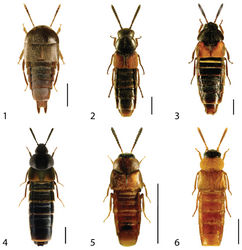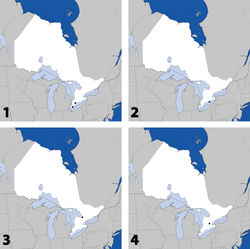Aleochara tristis
| Notice: | This page is derived from the original publication listed below, whose author(s) should always be credited. Further contributors may edit and improve the content of this page and, consequently, need to be credited as well (see page history). Any assessment of factual correctness requires a careful review of the original article as well as of subsequent contributions.
If you are uncertain whether your planned contribution is correct or not, we suggest that you use the associated discussion page instead of editing the page directly. This page should be cited as follows (rationale):
Citation formats to copy and paste
BibTeX: @article{Brunke2012ZooKeys186, RIS/ Endnote: TY - JOUR Wikipedia/ Citizendium: <ref name="Brunke2012ZooKeys186">{{Citation See also the citation download page at the journal. |
Ordo: Coleoptera
Familia: Staphylinidae
Genus: Aleochara
Name
Aleochara tristis Gravenhorst, 1806 New Ontario Record – Wikispecies link – Pensoft Profile
Material examined
CANADA: ON:Wellington Co., Guelph, field, 20.ix.1984, Brian Wisenden, 1 (DEBU).
Distribution
Canada: ON, QC, NB, NL; USA: CA, MN, NE, PA, VT. Widespread in Palaearctic, Oriental and Afrotropical Regions (Horion 1967[1]; Moore and Legner 1975[2]; Klimaszewski 1984[3]; Klimaszewski and Cervenka 1986[4]; Byers et al. 2000[5]; Smetana 2004[6]; Klimaszewski et al. 2005b[7]; Klimaszewski et al. 2011[8]). Adventive in Canada.
Comments
Aleochara tristis was intentionally released in the United States in 1965 to control populations of Face Fly (Musca autumnalis DeGeer), a nuisance pest of and disease vector for livestock, which breeds in their dung (Jones 1967[9]). In terms of biological control, the introduction appears to be a failure as this species is rarely collected and only as singletons. However, it is most certainly established in northeastern North America at low densities (Klimaszewski et al. 2005b[7], this study).
Taxon Treatment
- Brunke, A; Klimaszewski, J; Dorval, J; Bourdon, C; Paiero, S; Marshall, S; 2012: New species and distributional records of Aleocharinae (Coleoptera, Staphylinidae) from Ontario, Canada, with a checklist of recorded species ZooKeys, 186: 119-206. doi
Other References
- ↑ Horion A (1967) Faunistik der Mitteleuropaïschen Käfer. Volume II, Staphylinidae, part 3 Habrocerinae bis Aleocharinae (Ohne Subtribus Athetae). P.C. W. Schmidt, Überlingen-Bodensee, xxiv + 4190 pp pp.
- ↑ Moore I, Legner E (1975) A catalogue of the Staphylinidae of America north of Mexico (Coleoptera). University of California, Division of Agricultural Science, Special Publication No. 3015: 1-514.
- ↑ Klimaszewski J (1984) A revision of the genus Aleochara Gravenhorst of America north of Mexico (Coleoptera: Staphylinidae, Aleocharinae). Memoirs of the Entomological Society of Canada No. 129: 1-211. doi: 10.4039/entm116129fv
- ↑ Klimaszewski J, Cervenka V (1986) A revision of the genus Aleochara (Coleoptera: Staphylinidae) of America north of Mexico. Supplement 3. New distribution data. Entomological News 97: 119-120.
- ↑ Byers R, Barker G, Davidson R, Hoebeke E, Sanderson M (2000) Richness and abundance of Carabidae and Staphylinidae (Coleoptera) in northeastern dairy pastures under intensive grazing. The Great Lakes Entomologist 33: 81-106.
- ↑ Smetana A (2004) Family Staphylinidae Latreille, 1802, subfamilies Phloeocharinae-Apateticinae In: Löbl I Smetana A (Eds). Catalogue of Palearctic Coleoptera. Volume 2. Hydrophiloidea - Histeroidea – Staphylinoidea. Apollo Books, Stenstrup: 329-495.
- ↑ 7.0 7.1 Klimaszewski J, Sweeney J, Price J, Pelletier G (2005b) Rove beetles (Coleoptera: Staphylinidae) in red spruce stands, eastern Canada: diversity, abundance, and descriptions of new species. The Canadian Entomologist 137: 1-48. doi: 10.4039/n03-123
- ↑ Klimaszewski J, Langor D, Pelletier G, Bourdon C, Perdereau L (2011) Aleocharine beetles (Coleoptera, Staphylinidae) of the province of Newfoundland and Labrador, Canada. Pensoft Publishers, Sofia, Moscow, 313 pp.
- ↑ Jones C (1967) Aleochara tristis, a Natural Enemy of Face Fly. I. Introduction and Laboratory Rearing. Journal of Economic Entomology 60: 816-817.
Images
|

